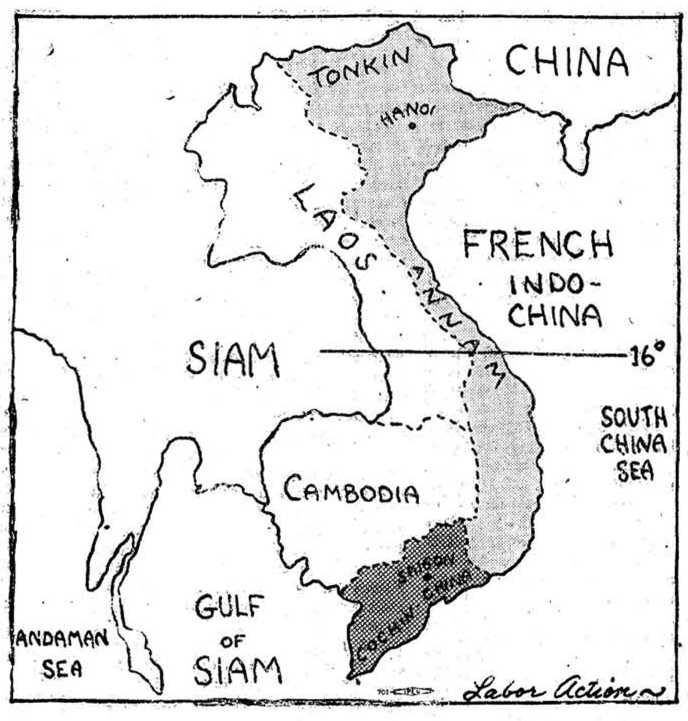
Main LA Index | Main Newspaper Index
Encyclopedia of Trotskyism | Marxists’ Internet Archive
From Labor Action, Vol. 11 No. 2, 13 January 1947, p. 3.
Transcribed & marked up by Einde O’Callaghan for ETOL.
Faced with the irresistible force of the movements of colonial independence. the imperialist nations veer and tack to maintain their weakened, power by economic domination of the colonies even where they are compelled to surrender political control. This is to be noted particularly in the case of India and Burma, Indonesia, and in part, Indo-China and the new republic of Viet Nam. In the latter case, the French are more determined to retain not only economic control, but as much political dominion as possible over the area formerly called Indo-China (composed of six provinces of which the most important are Cochin-China, Tonkin and Annam, now known as the Viet Nam republic).
Caught in the vise of their disintegrating social order at home and the increasing power of the independence movements in the colonies, the imperialist powers have developed a new strategy which is a departure from the old method of rule by the “sword.” That is not to say that the “sword” is no longer employed. But it is no longer the sole or primary method; it is now a reserve instrument employed to accompany the new “economic and political” approach. The big powers are quite willing to grant political concessions, to set up quasi-native governments, joint native-empire regimes, or even to grant complete political independence, on condition that they retain complete economic domination over the wealth of the colonial areas.
In Indo-China, however, we have a somewhat different situation. France is more adamant in its opposition to the political independence of the whole of Indo-China. The more feeble its power, the more vigorously it pursues the struggle to maintain the greatest possible control of its colonies.
French capitalism, utterly dependent on its colonial empire, shudders rivals by advocating a quasi-politi-nomic exploitation. This presses the other imperialist powers, especially the French, against the wall.

|
Last March, at Fontainebleau, France, an agreement was reached between the French government and the Viet Nam, which projected an Indo-Chinese federation to include the important Cochin-China province and its capital, Saigon. The French promised to hold a referendum in which Cochin-China would decide whether to remain an independent province or join in a federation with Viet Nam.
The referendum has not yet been held. The reason for this is that the French are opposed to a union of Viet Nam and Cochin-China. They know what the results of a referendum would mean: Cochin-China would vote overwhelmingly for such a union. This is indicated by the fact that newspapers advocating union of the provinces outnumber separatist papers by twenty to one.
First, the French divide the country and maintain the division; then, they oppose federation on the aground that the peoples are divided! To complicate the situation even more the French refuse to recognize the Viet Nam republic below the 16° latitude, thus splitting the independent province in two.
In addition, the French complain that there are some former Japanese soldiers in the Viet Nam army, but they neglect to mention that the number of Japanese serving Viet Nam does not begin to equal the former German prisoners in the French Foreign Legion, fighting in Indo-China.
The difference, however, is more fundamental: the former Japanese soldiers are in an army fighting for colonial independence, while the former German soldiers are serving an imperialist force assigned the task of putting down the struggle for Indo-Chinese freedom. Referring to these German soldiers, now serving French imperialism, Robert Trumbull, writing in the New York Times, says:
“These characters have been known, when intoxicated, to swagger about the streets of Saigon in groups singing the Horst Wessel song and raucously sieg-heiling.”
Now, the French have returned Admiral Thierry d’Argentieu as High Commissioner of Indo-China. The admiral, who is also a Catholic priest, is intensely hated by the people of the colony. To Viet Nam, this action is regarded as a provocation. But that is not all. The hope of the Indo-Chinese that the new government of Leon Blum would help their struggle for independence was rudely set back when the so-called socialist government decided to reinforce Admiral d’Argentieu with the return of the notorious Gen. Jacques Leclerc, who gained fame in his suppression of the national movement in-Indo-China during the time when he was French Commissioner at Hanoi.
“If anyone,” writes Trumbull, “is more disliked by the Annamites than Admiral d’Argentieu it is General Jacques Leclerc ...”
The result of this new development has been the intensification of preparations for war by both sides, the French determined to prevent the complete independence of the colony, while the overwhelming majority of the people of all the provinces are just as determined to fight for their freedom. In this situation the workers of all countries can do only one thing: support the independence movement against French imperialism, with the ringing cry
HANDS OFF INDO-CHINA!
Main LA Index | Main Newspaper Index
Encyclopedia of Trotskyism | Marxists’ Internet Archive
Last updated on 26 November 2020